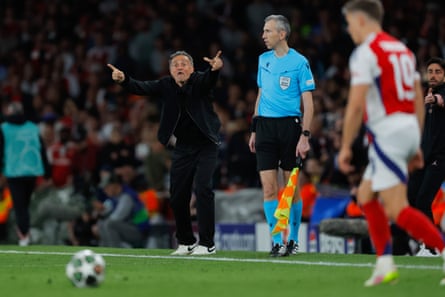
Hundreds of thousands of dementia patients in England face being denied access to revolutionary new drugs because the diagnostic capacity of the NHS lags behind every other G7 country, according to a damning report.
After decades of research to find a cure for the condition projected to affect 153 million people worldwide by 2050, scientists have successfully developed the first treatments to tackle the underlying causes rather than only relieve the symptoms. Two new drugs could get the green light for use on the NHS within weeks.
However, their effectiveness depends on prompt and early diagnosis of patients. The report, obtained by the Guardian, says the NHS lacks the diagnostic capacity to accurately identify those eligible in time.
The analysis reveals England is unprepared for the rollout of new treatments, with “large gaps in diagnostic capacity” for dementia. It also warns of a £14bn funding black hole that must be plugged if England is to diagnose dementia as quickly as the other G7 countries, the US, Canada, France, Germany, Italy and Japan.
To be eligible for either of the new drugs, lecanemab and donanemab, patients have to be in the early stages of dementia and have had scans to confirm high levels of amyloid in their brain. However, the report says England has the lowest per capita number of PET scanners of any G7 country and the lowest number of MRI scanners. England also has the second-lowest number of dementia specialists needed to diagnose the condition, such as neurologists, old age psychiatrists and geriatricians.
The analysis was produced by experts from organisations including Alzheimer’s Research UK, Alzheimer’s Disease International and the Alzheimer’s Society.
A second study, an NHS briefing paper also seen by the Guardian, estimates that as many as 280,000 patients in England may be eligible for the new treatments if regulators recommend the drugs for use in the health service. However, if the treatments are approved, the NHS would be unprepared for their delivery, the first report says.
“The potential approval of the first of the disease-modifying AD [Alzheimer’s disease] treatments in the UK as early as 2024, and the prospect of subsequent availability in England, shines a light on the stark gap in diagnostic infrastructure needed to provide high-quality dementia care,” it says.
“While future detection and diagnostic technologies might allow for lowering investment levels in later years compared to our projections, the progressive nature of AD means that prolonged wait times would deprive numerous patients of the opportunity to receive a treatment while it will still be effective.”
Dr Susan Mitchell, the head of policy at Alzheimer’s Research UK and a co-author of the report, told the Guardian the NHS had “suffered years of under-investment in diagnostics” and as a result dementia patients were “being left to fall through the cracks”.
“When it comes to diagnosing dementia, timing is everything. Yet right now, too many people are anxiously waiting to get a brain scan or speak to a specialist, and this is stopping them from getting the care and support they deserve. If new Alzheimer’s treatments are approved by regulators, delays to diagnosis could also hurt people’s chances of accessing them, as they are thought to be most effective for those who are in the disease’s earliest stages.”
The most recent NHS figures show fewer than two-thirds of people with dementia (64.5%) have a formal diagnosis – below the government’s target of 67%. People in England wait on average up to two years to receive a diagnosis, and up to four years if under 65.
For the report, the authors compared data and statistics for England with that of the six other countries in the G7. The report found England had the lowest number of PET scanners per 1 million people, at 1.20. Canada has 1.52, Germany has 1.63, France has 2.48, Italy has 3.55, Japan has 4.70, and the US has 5.45.
England also has the lowest number of MRI scanners per 1 million people (6.31), while Canada has 10.06, France has 15.38, Italy has 30.22, Germany has 34.47, the US has 40.44, and Japan has 55.21.
When it comes to dementia specialists, England also fares badly, with 5.04 per 100,000 people, according to the report. Only Canada has a worse record (4.94). France has 6.46, the US has 8.82, Japan has 11.08, and Italy has 15.58. Germany has almost five times as many as England (24.02).
It is estimated that only 2% of people getting a dementia diagnosis in England have access to gold standard tests, the report says.
after newsletter promotion
NHS England officials said dementia diagnosis rates were at their highest for three years. Staff had worked hard to recover services after the Covid-19 crisis when people were less likely to come forward for care, they said.
Mitchell said that without an overhaul of the diagnosis system, people in the earliest stages of dementia could be at risk of missing out on the first-of-a-kind treatments.
“It will be impossible to improve either early or accurate diagnosis without addressing gaps in the workforce and infrastructure – and this research shows just how far England has to go,” she said. “It is shocking to see us sitting at the bottom of the G7 tables for PET and MRI capacity, and only slightly better in terms of staffing. Investment in NHS staff, equipment and facilities is needed to turn the tide.”
The number of people living with dementia in the UK is predicted to rise from 944,000 to 1.6 million by 2050. “This is a crisis that should be at the top of the prime minister’s priority list,” said Mitchell.
The Department of Health and Social Care said it was working to identify and treat more people with dementia, and offer new treatments as they became available.
A spokesperson said: “NHS England is working on improving dementia diagnosis in care homes and taking steps to secure additional diagnostic capacity, including MRI, lumbar puncture and PET-CT scanners.”
Source: theguardian.com


















